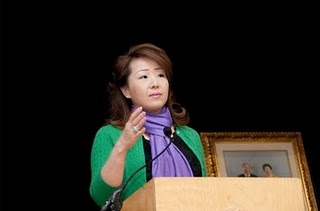 Just after Valentine's Day, Unification Church leader Sun Myung Moon solemnized the marriages of over seven thousand young couples in Seoul in yet another of the church's signature mass-weddings. Many church leaders believe the ceremony will be the last wedding officiation for the nonagenarian, who has recently bequeathed his match-making authority to the parents of prospective brides and grooms. With the aging of the church's founder and self-proclaimed Messiah, younger generations have become estranged with the church's doctrines and theology, resulting in dwindling membership in the church. Moon recently elected his daughter, In Jin, to be head of the American branch of the church, and, in response, In Jin has sought to lure back these young, estranged Unificationists by modernizing the church.
Just after Valentine's Day, Unification Church leader Sun Myung Moon solemnized the marriages of over seven thousand young couples in Seoul in yet another of the church's signature mass-weddings. Many church leaders believe the ceremony will be the last wedding officiation for the nonagenarian, who has recently bequeathed his match-making authority to the parents of prospective brides and grooms. With the aging of the church's founder and self-proclaimed Messiah, younger generations have become estranged with the church's doctrines and theology, resulting in dwindling membership in the church. Moon recently elected his daughter, In Jin, to be head of the American branch of the church, and, in response, In Jin has sought to lure back these young, estranged Unificationists by modernizing the church.
In her struggle as minister to create a modern-day church which keeps the children of its members in the fold and, potentially, convert non-believers, In Jin has relied largely on and evangelical Christian mega-churches as a prototype. Some of the ways in which she has overhauled the New York church include the replacement of fluorescent lighting with concert-style stage-lighting, the installation of a video screen to give a movie-like feel, and the replacement of old church hymns with modern rock music, reflecting trends which have come to define suburban and exurban mega-churches across the United States yet the headquarters of the American branch lies at the heart of a cosmopolitan city thronged with young, single entrepreneurs, professionals, and artists.
Like the greater Unification Church, formal education, family integrity, and a commitment to marriage first and love later form the focus of In Jin's mission to create a mainstream, modern-day ministry. Josh Schanker, son of the church's family department director, Phillip Schanker, is one of the young people who has sought to bridge the gap between mainstream society and the church, which some critics describe as cult-like. "Today, the church wants college valedictorians, not dropouts", he said in the words of Barbara Bradley Hagerty, _Fingerprints of God_ author and NPR religion correspondent. According to Hagerty, Josh "plans to be a consultant once he's graduated from Boston College. The church wants the second generation to fit into society not fight it." Indeed, both young and old Unificationists have emphasized the value of formal education: Phillip Schanker's eldest son is attending Harvard medical school, while two other sons of his have been granted full scholarships. In Jin herself is a graduate of the Harvard School of Divinity.
But, does this emphasis on formal education and the nuclear family merely reflect a staid and bourgeois attitude in the eyes of young and modern people, who are used to non-traditional couples and family structures? Perhaps, but maybe even more disconcerting for the church's "stray sheep" is the dogma which they claim characterizes Unificationist family life. For Jason Agress, who left the church at 14 when his parents raised objections over his dating preferences, "[e]verything was a system of control [ . . . ]. They were kind of breeding us to be a certain way. And if you weren't that way, there was something wrong with you." Another former Unificationist, D.F. Spratt, says that she used to have nightmares about being matched with a stranger and married to him in a mass-wedding. As Hagerty reports, "The pressure of being blessed, and so different from her peers, drove her away though with some trepidation." For such wary young people, the match-making of their parents looks a little too much like arranged marriage, the belief that love can be cultivated with enough devotion seems unreasonable, and the time invested in fabricating this love, wasteful. For them, marriage is a personal decision between bride and groom and is nobody else's business, and a family which insists on forging artificial bonds is an unhappy and dysfunctional one.
In Jin still hopes that, with its contemporary sermons and worship style, the Church will persuade its dubious youth to see the merits of traditional family values and parental matchmaking. People like Agress and Spratt, however, continue to view the church's preoccupation with arranged marriage, inherited religious faith, professional and academic prestige, and contrived family structure as controlling, unsatisfying, and ultimately unfair. Perhaps the church does show a willingness to adapt its worship style to modern life, but it may also cling to traditional norms which leave its youth unhappy. Let us know your thoughts about what path In Jin Moon and the Unification Church should take in trying to appeal to youth.


0 comments